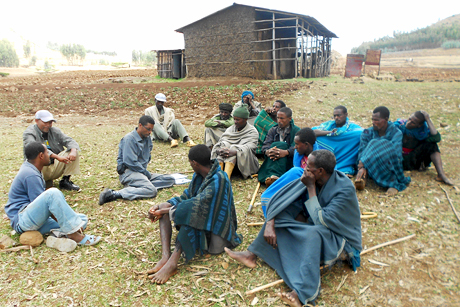
With unpredictable annual rainfall and drought once every five years, climate change presents challenges to feeding Ethiopia. Adapting to a warming world, the potato is becoming a more important crop there – with the potential to feed much of Africa.
Semagn-Asredie Kolech, a Cornell doctoral candidate in the field of horticulture, studies the potato and bridges the tradition of Ethiopian farming with the modernity of agricultural science.
He shuttles between Ethiopia and Ithaca to examine and research efficient agricultural practices in the shadow of climate change. “The potato is a good strategy crop for global warming. It has a short growing season, it offers higher yields, it’s less susceptible to hail damage, and you can grow 40 tons per hectare. With wheat and corn, you don’t get more than 10 tons a hectare,” Kolech says.


